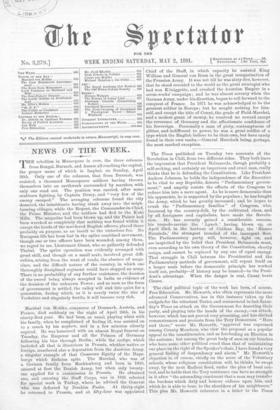Marshal von Moltke, con q ueror of Denmark, Austria, and France, died
suddenly on the night of April 24th, in his ninety-first year. He had been, as usual, playing whist with his family, when he complained of feeling ill, was assisted on to a couch by his nephew, and in a few minutes silently expired. He was honoured with an almost Royal funeral on Tuesday, the Emperor and all the Princes of Germany following his bier through Berlin; while the cortiwe, which included all that is illustrious in Prussia, whether native or foreign, numbered also a deputation from the Austrian. Army, a singular example of that (hombre= dignity of the Haps- burgs which disdains spite. The Marshal, who was of a German family from Mecklenburg and born in 1800, entered at first the Danish Army, but when only twenty- one applied for a commission in Prussia. He obtained one, and entering the Staff Corps, was in 1835 selected for special work in Turkey, where he advised the General -who was defeated by Ibrahim Pasha. At thirty-eight he returned to Prussia, and at fifty-four was appointed Chief of the Staff, in which capacity he assisted King William and General von Roon in the great reorganisation of the Prussian Army. It was not till he was sixty-five, however, that he stood revealed to the world as the great strategist who had won Kiiniggratz, and crushed the Austrian Empire in a seven-weeks' campaign; and he was almost seventy when the German Army, under his direction, began to roll forward to the conquest of France. In 1871 he was acknowledged to be the greatest soldier in Europe; but he sought nothing for him- self, and except the title of Count, the grade of Field-Marshal, and a modest grant of money, he received no reward except the reverence of Germany and the affectionate confidence of his Sovereign. Personally a man of piety, contemptuous of glitter, and indifferent to power, he was a great soldier of a type which the English believe to be their own, but have rarely found in their own ranks,—General Havelock being, perhaps, the most marked exception.






































